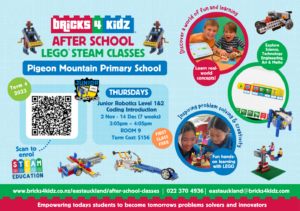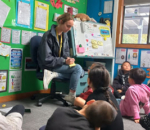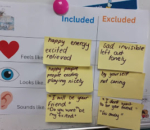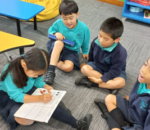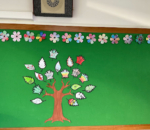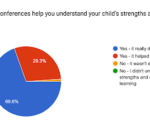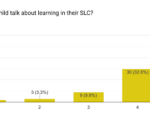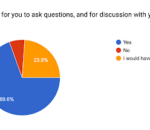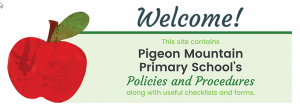From the Principal
 We thank everyone who participated in the 2023 Biennial Community Survey. In total there were 304 responses, representing 365 students. We are currently working through the lengthier responses to the survey in questions 8 and 9, but we have combined the responses from other questions and we are proud to share them with you below.
We thank everyone who participated in the 2023 Biennial Community Survey. In total there were 304 responses, representing 365 students. We are currently working through the lengthier responses to the survey in questions 8 and 9, but we have combined the responses from other questions and we are proud to share them with you below.
The percentages represent those who chose Agree or Agree strongly to each statement. Responses from the English and Chinese language versions have been combined.
| Questions about experiences as a parent | 2023 | 2021 | 2018 | 2016 |
| Pigeon Mountain students are proud of the school | 95% | 95% | 95% | 98% |
| Children feel safe at Pigeon Mountain School | 94% | 92% | 95% | 96% |
| Students rights are respected at PMPS | 94% | 93% | 92% | 92% |
| The school has a good reputation | 97% | 94% | 94% | 99% |
| The staff show respect to families and whanau | 94% | 94% | 93% | 92% |
| High standards of behaviour are expected | 93% | 91% | 91% | 93% |
| The school environment is attractive and well-maintained | 91% | 90% | 94% | 93% |
| The school is well managed and organised | 93% | 95% | 87% | 94% |
| High academic standards and expectations for learning are evident | 85% | 86% | 85% | 84% |
| Good pastoral care is provided for children | 84% | 81% | 79% | 70% |
| PMPS demonstrates the principles of the Treaty of Waitangi | 86% | 89% | 80% | 71% |
| The strategic direction of the school is clear and easy to understand | 87% | 86% | 83% | 81% |
| PMPS shows innovative use of up to date, modern technology | 85% | 89% | 87% | N/A |
| Questions about elements of teachers and teaching | 2023 | 2021 | 2018 | 2016 |
| Teachers care about students as individuals | 89% | 92% | 92% | 85% |
| Teachers provide high quality teaching and learning experiences | 87% | 90% | 90% | 87% |
| Children are treated responsibly and have a say in their school | 91% | 89% | 91% | 88% |
| EOTC opportunities are about right | 81% | 75% | 70% | 75% |
| Teachers use technology to enhance learning | 86% | 93% | 87% | 94% |
| School is well resourced | 88% | 89% | 89% | 89% |
| My child has their learning needs met | 82% | 85% | 82% | 83% |
| Questions about student learning | 2023 | 2021 | 2018 | 2016 |
| My child is engaged in their learning | 92% | 89% | 88% | 89% |
| School acknowledges and responds to diversity in our students | 93% | 86% | 91% | 91% |
| Our children are supported to develop their self-esteem | 91% | 90% | 93% | 87% |
| Our children know what to do to be successful | 78% | 79% | 72% | 76% |
| School has a good range of cultural opportunities | 89% | 82% | 87% | 87% |
| School has a good range of sporting opportunities | 79% | 81% | 80% | 87% |
| Students with special learning needs are identified and catered for | 70% | 64% | 68% | 68% |
| There is a good range of arts opportunities | 73% | 72% | 71% | 73% |
| I understand the information I am given about my child’s progress and achievement | 93% | 91% | 89% | 85% |
| The school provides useful written information about the academic progress of my child | 83% | 87% | 89% | 82% |
| Questions about parent communication with school | 2023 | 2021 | 2018 | 2016 |
| Parents and whanau feel encouraged to be involved in school and its activities | 94% | 91% | 93% | 95% |
| PMPS has effective ways of making sure parents feel welcome | 94% | 93% | 91% | 92% |
| The school regularly seeks feedback in order to improve | 94% | 86% | 78% | 80% |
| Parents feel safe and able to approach school with serious concerns | 84% | 83% | 84% | N/A |
| School has effective procedures in place for dealing with serious concerns | 73% | 71% | 68% | N/A |
| Questions about governance and donations | 2023 | 2021 | 2018 | 2016 |
| The BoT is doing a good job of governing the school | 82% | 81% | 81% | 80% |
| The current school donation offers good value for money | 70% | 79% | 92% | 85% |
| I am aware of how the donation is used by the school | 79% | 59% | 64% | 57% |
| Paying the donation is easy and uncomplicated | 90% | 89% | 91% | 87% |
Mental Health Education in Team Manuka
At Team Manuka, we have been exploring the book ‘The Invisible Boy’ by Trudy Ludwig. Through this story, we are teaching our children the significance of aroha, respect and manaakitanga (empathy and kindness). It’s not just about reading; it’s about understanding the feelings and experiences of others that are not always the same as ours.
Our students are actively discussing what it means to be ‘included’ and ‘excluded,’ focusing on what it sounds like, looks like, and how it feels. Students added their ideas onto leaves and created a collaborative display of ways we can be inclusive at school.
By incorporating “Mana Whānau” (the importance of connections with others) and “Mana Ūkaipo” (sense of belonging in the place where we learn) into our lessons, we are not only nurturing academic growth but also building a foundation for a kinder and more empathetic school community.
Learning with whānau: Ask your child what qualities they look for in a friend, share some of the qualities that you enjoy about your own friends. Discuss with your child ways they can include others if they see people who may be “invisible”.
Student-led Conferences (SLCs) Feedback
We had 92 responses to our student-led conferences questionnaire this year. Thank you to all those that took the time to provide your feedback. It has provided us with great insights to improve on our reporting in 2024.
Here are some of the key insights that we have learned from the questionnaire:
What did you like about the SLCs?
Child-centered learning: Parents appreciated that conferences allowed them to focus on their child’s learning and achievements. They liked hearing about their child’s progress, seeing their work, and understanding what they were learning at school.
Confidence and autonomy: Many parents mentioned that they valued the opportunity for their children to take ownership of their learning and showcase their work with confidence. They believed this boosted their child’s self-esteem and independence.
Interaction with teachers: Parents found it valuable to interact with teachers during conferences. They wanted to discuss their child’s progress, ask questions, and receive insights from the teacher’s perspective.
Understanding curriculum: Parents expressed a desire to gain a better understanding of the school’s curriculum and the topics their children were studying. They appreciated having a clearer picture of what was being taught.
Hands-on experience: Some parents liked the hands-on experience of exploring their child’s learning environment, looking at books and projects, and participating in activities alongside their child. This gave them a deeper understanding of the educational experience.
What didn’t you like about the SLCs?
Ineffectual communication: A few parents felt that the conferences did not effectively address their concerns or provide a clear understanding of their child’s progress, though this was not a widespread sentiment.
As a school, our teachers are going to reflect on their levels of proactivity during the conferences.
Awkwardness for the child: Parents reported that their child felt uncomfortable during the conferences when there were multiple parties involved, such as the parent, teacher, and the child, but this was not universally expressed.
As a school, our teachers are going to share the level of preparation across the classrooms and teams to ensure that the children are well prepared for their role in these conferences.
Inability to address specific concerns: Some parents expressed frustration with the lack of opportunity to discuss specific issues or receive adequate answers to their questions about their child’s education, although not all parents shared this sentiment.
We encourage parents to book a follow up appointment for any questions that have gone unanswered. As always, teachers are your first port of call and are keen to hear from you face to face, by email or through a phone call.
Any more ideas…
Desire for more opportunities: Some parents expressed a desire for more interactive and engaging meetings like student-led conferences.
As a school, we are exploring the possibility of termly open afternoons and parent curriculum information evenings.
Time for student-teacher chat: A few parents suggested allocating time for a chat between the student and teacher in addition to the parent-student interaction.
Steps to improve each area of learning: A parent asked for guidance on what steps or actions can be taken to improve their child’s progress in specific areas of learning.
Athletics Day
We are seeking some more parent helpers for our Athletics day this Wednesday. If you would like to join our parent volunteer team, please contact Mr Marshall directly through email dylanmar@pmps.school.nz
If you are interested in volunteering at upcoming school events, please complete the attached survey form- we are always grateful for your assistance!
Teacher Only Day – Tuesday 14th November
As previously advertised, all schools have been advised by the Ministry for Education to take a Teacher Only day relevant to the adoption of the new NZ National Curriculum. We have secured a facilitator for Tuesday 14th November necessitating the Tuesday, rather than our normal Mon/Fri extension to a weekend.
Prize-Giving Assemblies
Thu 7 December
Puriri 9.15am to 10.15am
Manuka 11.15am to 12.15pm
Pohutukawa 1.30pm to 2.30pm
Fri 8th December
Kauri 9.15am to 10.45am
Titoki 11.15am to 12.45pm
Kahikatea 1.15pm to 2.45pm
Mon 11th December – Year 6 Awards and Graduation – 6pm (TBC)
Dates for your Diary
Wednesday 1 November – School Athletics Day
Tuesday 14 November – Teacher Only Day
Thursday 7 December – Junior Prize giving Assemblies
Friday 8 December – Senior Prize giving Assemblies
Monday 11 December – Year 6 Graduation
Friday 15 December – School finishes for the year
Tuesday 30 January 2024 – Term 1 commences
Community Notices
